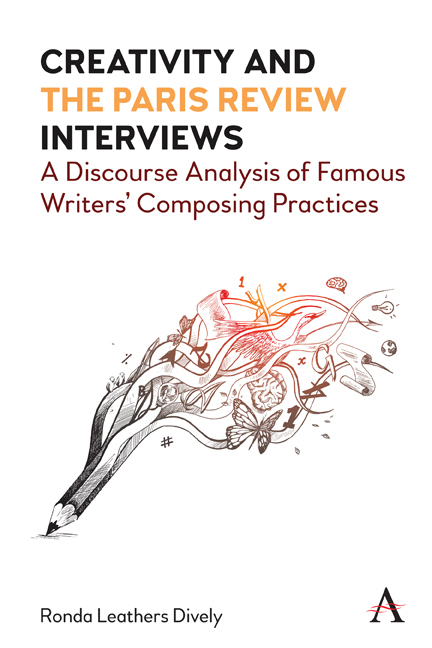 Creativity and 'the Paris Review' Interviews
Creativity and 'the Paris Review' Interviews Book contents
- Frontmatter
- Contents
- List of Illustrations
- Preface
- Acknowledgments
- 1 Impetus, Contexts and Methods
- 2 Composition through the Lens of Creativity Theory
- 3 First Insight, or the Glimmer of Possibility
- 4 Preparation, or Research Broadly Conceived
- 5 Incubation, or Breaks from Conscious Attention
- 6 Insight, or the Eureka Experience
- 7 Verification, or Evaluation
- 8 Emergent Patterns
- 9 Implications for Writing Instruction
- Appendix A Coding Table
- Appendix B List of Cited Paris Review Interviewees
- Appendix C Diagram of Analytical Categories, Subcategories and Themes
- References
- Index
4 - Preparation, or Research Broadly Conceived
Published online by Cambridge University Press: 27 April 2022
- Frontmatter
- Contents
- List of Illustrations
- Preface
- Acknowledgments
- 1 Impetus, Contexts and Methods
- 2 Composition through the Lens of Creativity Theory
- 3 First Insight, or the Glimmer of Possibility
- 4 Preparation, or Research Broadly Conceived
- 5 Incubation, or Breaks from Conscious Attention
- 6 Insight, or the Eureka Experience
- 7 Verification, or Evaluation
- 8 Emergent Patterns
- 9 Implications for Writing Instruction
- Appendix A Coding Table
- Appendix B List of Cited Paris Review Interviewees
- Appendix C Diagram of Analytical Categories, Subcategories and Themes
- References
- Index
Summary
In the trajectory of any given artistic or scientific endeavor, the sense of excitement attending first insight (see Chapter 3)—as well as the subsequent insights crucial to realizing an initial vision (see Chapter 6)—often gives way to memories of prolonged, unglamorous, mentally and physically taxing groundwork essential to creative achievement. Such groundwork falls under “preparation” in the paradigmatic creative process model, the term no doubt bringing to mind (in line with the definition in Chapter 1) images of lonely individuals locked in various modes of formal research: a chemist vetting the most recently published articles in her field to determine relevance for a current experiment, a painter meticulously observing the landscape he's decided to depict on canvas, a playwright devouring biographies of the famous character she's struggling to portray. All of these activities qualify as preparation, but this element of the creative process model is far more wide-ranging than these examples imply. In addition to formal research lies the instructive potential of virtually all experiences and relationships, both personal and professional. In the end, then, it is reasonable to assume that every aspect of an artist's or scientist's existence is a possible resource for preparation.
Excerpts classified as preparation from The Paris Review (PR) interviews sampled for this study demonstrate that poets and fiction writers rely on varied means of acquiring knowledge or information needed to satisfy their creative aspirations. As expected, these writers collectively reference a diversity of formal research strategies, as well as periods of deep reflection on significant life events from early childhood through late adulthood. Frequently, preparatory effort follows directly upon first insights; at other times, in recursive fashion, it commences or resurfaces when a project in question is well underway. Because the category of preparation is so sweeping and eclectic, it demonstrates more glaringly than any other category in this study the interpretive nature of the coding processes as recognized in the permeable boundaries of not only the subcategories to be identified but also the themes within those subcategories.
Despite the challenges of assigning textual units (a total of 490) relevant to preparation, they convincingly align in six viable, if admittedly overlapping, subcategories: mentorship, distinctive personal experiences, formal research, study of others’ literary works, prewriting strategies and cross-pollination between disciplines.
- Type
- Chapter
- Information
- Creativity and 'the Paris Review' InterviewsA Discourse Analysis of Famous Writers' Composing Practices, pp. 51 - 72Publisher: Anthem PressPrint publication year: 2022


